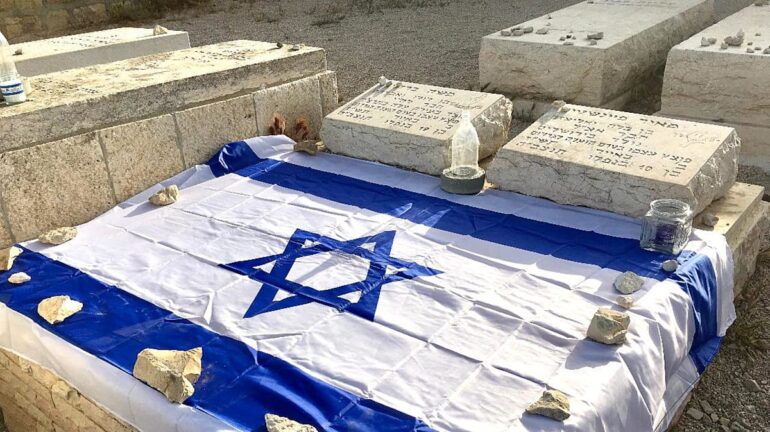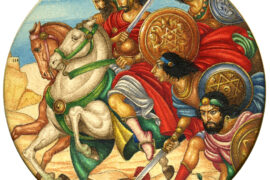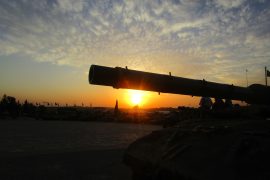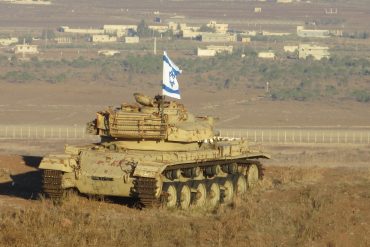The second day of Iyar marks the date that Moshe Barazani and Meir Feinstein blew themselves up in their Jerusalem prison cell rather than be executed by the British regime.
Following the crushing defeat of the Ottoman Empire during World War I, Britain and France began dividing the Semitic region between themselves. But because the horrors of the war had been largely blamed on the imperialist ambitions of rival powers, London and Paris masked their designs behind a new system of “mandates” ostensibly meant to help indigenous peoples attain self-determination in the territories formerly ruled by Ottoman Turkey.
Unlike their French counterparts, British officials were especially skilled at legitimizing their rule in the former Ottoman territories by enticing native peoples to publicly voice support and lobby for British patronage on their way to independence. In 1917, British Foreign Secretary Lord Arthur James Balfour issued a declaration committing his government to the establishment of a “Jewish national home” in Palestine.
The Balfour declaration won London the support of Palestine’s Jewish community, as well as politically active Diaspora Jews, who successfully urged the League of Nations to grant Britain a mandate over Palestine.
Palestine was especially important to the British Empire as it was viewed as necessary for control of the Suez Canal. Britain also won a mandate over Mesopotamia (Iraq), from where the British would pipe oil to be refined in Palestine’s coastal port city of Haifa and then shipped out on tankers to other pockets of the empire.
As Britain’s navy had just transitioned from coal dependency to oil dependency, both the oil of Mesopotamia and the Haifa refinery and ports on the Mediterranean Sea became crucial for London’s imperialist designs.
In order to ensure permanent British rule over Palestine, measures were taken to render the establishment of a Jewish state impossible. Shortly after receiving the League of Nations mandate, the British began to publish a series of “White Papers” designed to limit Jewish migration and property rights.
As early as 1920, the British administration in Palestine also began employing the empire’s traditional colonial policies for dividing and ruling native peoples. Palestine’s Jewish and Arab populations were successfully pitted against one another, birthing a deadly conflict that continues to rage over a century later.
By 1939, a small group of Jewish militants had started to recognize the senselessness in fighting their Arab neighbors and instead turned their guns against the British regime. These radicals, led by a poet named Avraham Stern (but better known in Israel as Yair), ultimately morphed into an anti-imperialist underground called Leḥi (Fighters for the Freedom of Israel).
Known to the British as the dreaded Stern Gang, the fighters viewed themselves as an extension of the many Hebrew liberation movements dating all the way back to the Jewish revolts against ancient Rome.
Understanding the forces driving imperialism, the Sternists identified Britain’s economic interests in the region and began to relentlessly strike at those interests in addition to British officials and military personnel. Attempting to create a united anti-imperialist front with the other peoples of the Semitic region, Leḥi rejected the Zionist institutions and leadership, accusing them of collaborating with British colonialism.
Moshe Barazani had moved with his family from Iraqi Kurdistan to the Old City of Jerusalem at the age of six. While still very young, Moshe joined Leḥi, at first posting up propaganda as a member of the youth division and then later fighting the British as part of the movement’s combat brigade. On March 9, 1947, Barazani was arrested in Jerusalem with a grenade in his pocket.
At his 90-minute trial on March 17, he was sentenced to death. Barazani’s only statement to the British court was the following:
“The Hebrew nation sees in you an enemy, a foreign regime in our country. We, the Fighters for the Freedom of Israel, are waging war against you in order to free our homeland. In this war I have fallen your prisoner and you have absolutely no right to judge me. You will not frighten us with hangings and you will not succeed in breaking us. My people and all peoples oppressed by you will fight your empire until it is destroyed!”
While awaiting the gallows in the Jerusalem Central Prison, Barazani shared a death row cell with Meir Feinstein, a young fighter from the Etzel (National Military Organization), which had joined Leḥi‘s armed struggle against Britain in 1944.
Feinstein had been born in the Old City of Jerusalem and had studied at the Etz Ḥaim Yeshiva as a disciple of Rav Aryeh Levin. On October 30, 1946, Feinstein had participated in a sabotage operation on the Jerusalem railway station aimed at paralyzing British transportation in the country. The British had advance warning of the raid and were waiting in ambush for the Etzel fighters. Upon arriving at the station in taxi cabs, Feinstein and his comrades came under British fire. Four of the fighters were hit, including Feinstein, whose left arm had been shattered.
With only one arm, Feinstein managed to drive his comrades in one of the taxis to Jerusalem’s Yemin Moshe neighborhood, where the group split up. But because Feinstein’s arm had left a trail of blood, occupation forces were able to easily find and arrested him. He was taken to hospital, where his left arm was amputated.
Feinstein’s trial opened on March 25, 1947. He didn’t participate in the proceedings, rejected legal counsel and refused to recognize the authority of the British military court to try him. Before the verdict against him was read, Feinstein delivered a defiant speech against British rule:
“Officers of the occupation army! A regime of hanging trees is the regime you wish to impose on this land, which was destined to be a lighthouse for all of humanity, and in your foolish wickedness, you presumed that by this regime you will break our people’s spirit, the people to whom this whole country had been a gallows. You were wrong. You will learn that you have encountered steel, steel forged in the fire of love and hatred – love for the homeland and freedom, hatred for enslavement and invader. Burning steel it is. You will not break it. You will burn your hands.
How great is your blindness, British tyrants? Did you not notice who stands against you in this campaign, unexampled in the history of mankind? Shall you scare us with death? We, who have listened for years to the rattling of the wheels of them railroad cars, who led our brothers, our parents, the best of our nation – to slaughter, which too had no precedent in human history? We, who asked, and ask ourselves everyday: in what are we better than them? From the millions of our brothers? What have we won? For we could have been among them and with them in the days of fear and in the moments of dying.
And to these recurring questions, there is in our conscience but one answer: we remained alive not to live and await in conditions of slavery and oppression, a new Treblinka. We remained alive, to ensure life, freedom and dignity for us, for our nation, for our children and their children for generations to come. We remained alive so that it wouldn’t matter anymore that which happened there and might happen under your rule, the rule of treason, the rule of blood.
Therefore we shall not be frightened, for we have learned and by countless of victims for nothing we have learned – that there is life worse than death, and there is death greater than life…”
Barazani and Feinstein became close friends in prison and together decided that in order to avoid Jerusalem being defiled through their executions, they would emulate the Biblical hero Shimshon and find a way to die together with their enemies. They had their comrades outside smuggle a grenade into the prison disguised as an orange. When the guards would come to take them to the gallows, the boys planned to blow themselves up together with the British.
The night before their scheduled execution, Rav Yaakov Goldman came to comfort the young fighters. But rather than recite the traditional confession, the rabbi told the boys that they had nothing to confess as they would be giving their lives for the liberation of their people.
After many hours together, Rav Goldman insisted that he return the following day to be present at their execution. The fighters attempted to discourage him from returning but the rabbi was determined to witness their bravery in order that he could tell the youth of their heroism in the face of death.
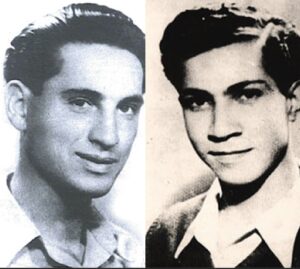
Barazani and Feinstein were confronted with a difficult dilemma. They couldn’t set off the grenade with the rabbi present but they also didn’t want to endanger their plan by warning him to stay away. The boys decided to forgo killing their guards but would still prevent the British from carrying out the executions.
On Monday 2 Iyar, 5707 (April 21, 1947), half an hour before the executions were scheduled to take place, an explosion echoed through the Jerusalem central prison. Moshe Barazani and Meir Feinstein had sung the HaTikva, ending with the verse yearning to once again be a free people in Jerusalem. They then embraced in their cell with the grenade held between their hearts.
Although Barazani and Feinstein had prevented the British regime from ever hanging Jewish fighters within the city of Jerusalem, many of their comrades would be executed on the gallows of Akko and Cairo. But each hanging turned Palestine’s youth more and more against the British regime, swelling the ranks of the Jewish underground organizations and making British interests in the country impossible to attain.
On September 27, 1947, Britain announced that it would be officially terminating its mandate for Palestine on May 14, 1948. On that day, the British published a final White Paper in which it credited the Jewish underground fighters with forcing the empire from Palestine.
The London Sunday Times would later concur with the government’s assessment, writing the following: “If any one event forced us to leave Israel and permit the Jews to create a Jewish state, it was the defiant resistance of these young Jews who were led to the gallows. It may be said that after two thousand years, the Jewish state rose again on the broken necks of those who mounted the gallows.”

